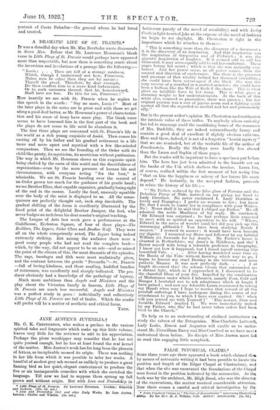A DRAMATIC LIFE OF ST. FRANCIS.*
IT was a dreadful day when Mr. Max Beerbohn wrote Savonarola in Seven Men. Before that Mr. Laurence Housman's blank
verse in Little Plays of St. Francis would perhaps have appeared
more than respectable, but now there is something comic about the inversions and involutions of a passage like the following :- " Lucia : . . . Thou art full of a strange madness, Which, though I understand not how, Francesco, Makes men be other than they are by nature : Thyself the proof. Therefore, by dear example, Do thou confirm him to a more kind forbearance, Or to such measures thereof, that he, henceforward, Shall hate me less. Do this for me, Francesco ! "
How heartily we are with St. Francis when he replies to this speech in the words : " Say no more, Lucio " Most of the later plays in the series are in prose and with these we get
along a good deal better, as Mr. Housman's power of characteriza- tion and his sense of irony have more play. The blank verse seems to have bemused him in the first part of the book and the plays do not come to life until he abandons it.
The first three plays are concerned with St. Francis's life in the world as a rich young exquisite of Assisi. Then comes his
casting off by his father and his gradual retirement to a life -more and more apart and mystical with a few like-minded companions. Then we see the founding of the Order with its child-like gaiety, its mysticism, its asceticism without puritanism.
The way in which Mr. Housman shows us this exquisite spirit being choked by the cares of this world and the deceitfulness of organization—even by the mere pressure of human life and circumstances, with everyone acting " for the best," is admirable. We see St. Francis handing over the control of an Order grown too much for the guidance of his gentle hand ; we see Brother Elias, that capable organizer, gradually losing sight of the end in the means. Lastly the final, unseemly squabble over the body of the saint is displayed to us. All the conse- quences are perfectly thought out, each step inevitable. The gradual shifting of the focus is excellently illustrated by the fixed point of the delightful Brother Juniper, the fool, who never budges an inch from his dear master's original teaching.
The League of Arts last week gave a performance at the Guildhouse, Eceleston Square, of four of these plays—The
Builders, The Lepers, Sister Clare and Brother Wolf. They were all on the whole competently acted, The Lepers being indeed extremely striking. But among the audience there were a good many people who had not read the complete book—
which, by the way, did not appear to be on sale—and so missed the point of the climax of this, the most dramatic of the episodes.
The rags, bandages and filth were most realistically given, and the contrast between the gentle " Poverello."—St. Francis —full of loving-kindness, and those snarling, huddled bundles of rottenness, was excellently and sharply indicated. The pro- ducer obviously had a knowledge of the pathology of leprosy. Much more ambitious than Angels and Ministers and the play about the Victorian family in heaven, Little Plays of St. Francis are much less successful. Angels and Ministers was a perfect study in genre : individually and collectively Little Plays of St. Francis are full of faults. Which the reader will prefer will be a matter of aesthetic and ethical focus.
TARN.


































 Previous page
Previous page